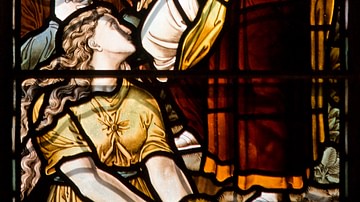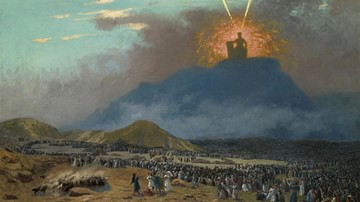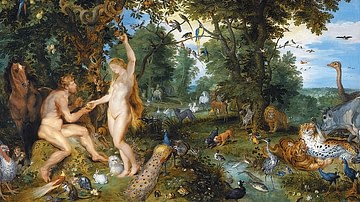What does the word bible mean?
The word bible simply means “book.” The English word bible is ultimately derived from the Greek term biblia, meaning “books.” Biblia is the plural form of biblion, which denotes any written document, but originally one inscribed on papyrus. Our word Bible eventually came to be used for the collection of 66 Old and New Testament books recognized by Christians as the canon of Scripture.
The Greek phrase ta biblia to hagia meant “the holy books.” The first Christian use of the term ta biblia, or “the books,” to designate the Holy Scriptures is believed to be in 2 Clement 2:14, written around AD 150: “The books and the apostles plainly declare that the Church hath been from the beginning.” In Latin, the Greek phrase became biblia sacra. In Old French, the word biblia became bible. Old English already had a word for the Scriptures, biblioðece, taken from the Latin word for “library.” But the shorter Old French word bible replaced it in the early fourteenth century.
The concept of a collection of holy writings developed early in both Jewish and Christian thought. In the sixth century BC, the prophet Daniel referred to the prophetic writings as “the books” (Daniel 9:2). Synonymous terms for Bible are the writings, Scripture, Holy Scriptures, and Holy Writ, which means “sacred writings.” In the early Jewish historical writing of 1 Maccabees, the author refers to the Old Testament as “the holy books” (12:9). Jesus made reference to the books of the Old Testament as “the Scriptures” in Matthew 21:42, and the apostle Paul called them “the Holy Scriptures” in Romans 1:2.
Today, the word bible can be used generically to refer to any book widely viewed as an authority on a certain topic. For example, bow hunters may speak of a book giving expert advice on how to track and bring down a trophy deer as a “bow hunter’s bible.” Or a publication for aquarium enthusiasts, written by a veteran hobbyist, might be called an “aquarist’s bible.” Capitalized, Bible usually refers to the Holy Scriptures as understood by Christians around the world.
The Bible is the Word of God; it is God’s book written to humankind. The Bible is God’s guidebook for how to live our lives: “But you must remain faithful to the things you have been taught. You know they are true, for you know you can trust those who taught you. You have been taught the holy Scriptures from childhood, and they have given you the wisdom to receive the salvation that comes by trusting in Christ Jesus. All Scripture is inspired by God and is useful to teach us what is true and to make us realize what is wrong in our lives. It corrects us when we are wrong and teaches us to do what is right. God uses it to prepare and equip his people to do every good work” (2 Timothy 3:14–17, NLT).
The Bible, the book of God, is a light to illuminate our way: “Your word is a lamp to guide my feet and a light for my path” (Psalm 119:105, NLT). It is like food that nourishes and sustains us (Matthew 4:4; Hebrews 12:12–14). The Bible outlines and elaborates on God’s interactions with humans throughout history. In it, we learn of His eternal purposes and His loving plan of salvation. Most importantly, the Bible is God’s personal love letter to us: “For God so loved the world that he gave his one and only Son, that whoever believes in him shall not perish but have eternal life. For God did not send his Son into the world to condemn the world, but to save the world through him” (John 3:16–17).
For Further Study
The Quest Study BibleMore insights from your Bible study – Get Started with Logos Bible Software for Free!
Related Articles
What does the word testament mean?What is the purpose of the Bible?Why should I believe the Bible?Why is the Bible called the Holy Bible?What are the different names and titles of the Bible?
-
The GospelsKotomi Yamamura (CC BY-NC-SA)
The Bible takes its name from the Latin Biblia (‘book’ or ‘books’) which comes from the Greek Ta Biblia (‘the books’) traced to the Phoenician port city of Gebal, known as Byblos to the Greeks. Writing became associated with Byblos as an exporter of papyrus (used in writing) and the Greek name for papyrus was bublos.
Although the Bible is often considered a single, cohesive, work, it is actually an anthology of ancient writings by many different authors over many centuries, which were collected in a single book. The Bible contains works of poetry, religious-themed narratives, philosophical musings such as The Book of Ecclesiastes, epistles, and the apocalyptic masterpiece known as The Book of Revelation.
The common thread in these collected works is the existence of an all-powerful deity who is the creator of the universe & has an interest in the lives & fate of humans.The common thread in all these collected works is the existence of an all-powerful deity who is the creator of the universe and has an interest in the personal lives and final fate of human beings. The books of the Christian Bible were arranged in the sequence one finds them in today to tell the story of the creation of the world by a supreme deity, the fall of man from paradise, and humanity’s redemption by the Son of God but these books were not written in that sequence nor would the original authors of the Old Testament works have had that particular story in mind.
The Bible of Judaism (collected and authorized by c. 3rd century BCE) contains the Torah (the first five books of the Bible) and the Tanakh (the stories of the judges and prophets) and makes no mention of Jesus Christ. The God of the Bible in these works is the God of Judaism – a single all-powerful deity – and, prior to the appropriation of Hebrew scriptures by early Christianity, the stories which made up the Bible told the story of God’s care for and intervention in the affairs of the Israelites of the Middle East.
Structure of the Bible
In Judaism, the scriptures are called the Tanakh and are recognized as comprising 24 books divided into three categories: The Pentateuch (or Teachings of the Five Books of Moses), The Prophets, and The Writings. Christianity, which appropriated the Tanakh and claimed it as their own early theological history, call it the Old Testament. Early Christian writers, years after the probable date of the death of Jesus, penned the gospels and The Book of Acts. Paul the Apostle wrote most of the epistles which make up the 27 books of the Christian New Testament and whose theology informs the gospels. The Book of Revelation, attributed to John of Patmos, is the last book of the Christian Bible.
 Moses & the Parting of the Red SeaProvidence Lithograph Company (Public Domain)
Moses & the Parting of the Red SeaProvidence Lithograph Company (Public Domain)It is difficult to accurately date the composition of the books which make up the Bible, but scholars generally agree that the Pentateuch dates to the 10th and 6th centuries BCE and that the Tanakh was fixed as scripture well before the 1st century CE. The books of the Christian New Testament were composed between 60-110 CE (the Gospels), 45-130 CE (the Epistles), and 68-100 (The Book of the Revelation of St. John). Many people of the ancient world, and even today, believe the Bible to have been written by God. It is held to be the bestselling book in history and has influenced religious thought worldwide for centuries.
Brief Synopsis & Commentary
The book of Genesis, the first book of the Old Testament, tells the story of the creation of the universe, the world, and humanity, the fall of man in the Garden of Eden, and the great flood which God sent on the world because of the evil of mankind. Following the flood, Noah‘s children repopulate the earth and the narrative then follows the stories of his descendents who are the Hebrew ancestors of the men who wrote the stories. The tale of Joseph and his coat of many colors brings the Hebrews from their land of Canaan to Egypt where, the Book of Exodus explains, they became slaves.
They were led from Egypt to freedom by the great lawgiver Moses who then passed his leadership to his second-in-command Joshua son of Nun whose army lay waste to the region of Canaan so the Hebrews could claim it as the land promised to them by their God (as told in the Books of Joshua and Numbers). Following the establishment of the people who called themselves Israelites in the land, famous kings such as David and his son Solomon ruled and great prophets such as Jeremiah and Isaiah, Ezekial and Jonah preached the will of their God.
The New Testament focuses on the life and teaching of Jesus Christ, the son of God sent to redeem humanity from sin. Jesus is born of the virgin Mary and begins his ministry, preaching a direct and personal relationship with God, when he is about 30 years old. He is betrayed by one of his followers and crucified by the Romans for inciting sedition. Three days after his death, he rises from the grave and ascends to heaven to rule at the right hand of God the father. In his place, he sends the Holy Spirit who will henceforth minister to believers on earth. The New Testament ends with the vision of the end of the world as told by John of Patmos.
 Jesus Christ PantokratorHardscarf (CC BY-NC-SA)
Jesus Christ PantokratorHardscarf (CC BY-NC-SA)The first four books (Matthew, Mark, Luke, and John) are often believed to be eyewitness accounts of Jesus’ ministry on earth but are not. The practice of writing under a famous person’s name or, at least, attributing what one had written to someone better-known was well established at the time the gospels were written, and it is probable that the authors chose the names of people who were already well respected in the Christian community to gain a wider acceptance of the material.
There is also good reason to believe that the gospel narratives (both those included in the Bible and those which were rejected) are examples of a literary genre known as Mesopotamian Naru Literature in which some great historical figure (usually a king) is featured in an otherwise fictional tale. In the case of the gospels, it has been suggested, there may have been an historical figure such as Jesus of Nazareth who inspired stories and legends but the facts of that person’s life are obscured by the genre they were written in which focuses on imparting an important cultural or spiritual truth, not relating history.
Because the gospels come before the Book of Acts and the Letters of Paul in the New Testament, many people seem to believe that these works were written first and the events they relate happened earlier than the later books; actually, the reverse is true. The letters of Paul came first and the gospels were written later. Paul’s vision, in fact, informs all four of the gospels in the Bible and well as the Book of Acts.
The stories in the Bible were considered historically accurate until archaeologists discovered the civilizations of Mesopotamia & Egypt.Between 42-62 CE Paul the Apostle traveled throughout the Mediterranean on his evangelical missions preaching the new religion of the risen Christ. The Bible itself in the Book of Acts and I Peter allude to the possibility, explored in depth in the late 19th and early 20th century CE, that Paul’s version of Christianity was different from the message preached by Jesus of Nazareth. Paul (formerly Saul) of Tarsus was a Jewish pharisee of Tarsus (in modern-day Turkey) who claimed to have received a vision from God which convinced him of the reality of Jesus Christ as the risen son of the creator of the universe sent to earth to die for the sins of man.
While many people have since considered this a miraculous occurrence which displays God’s love for humanity through the sacrifice of his son, the concept of the dying and reviving god figure was well known in Paul’s time, and it is probable that beliefs such as the Cult of Isis informed the basis of Paul’s religious views. The understanding of the Bible between the time of Constantine I‘s elevation of Christianity (which would become the religion of Rome in the 4th-5th centuries CE) and the next few hundred years was relatively unchanged until the Protestant Reformation of the 16th century CE but, in the 19th century CE, biblical interpretation underwent a radical reformation.
Biblical Understanding & 19th-century CE Archaeology
The stories which the Bible relates were considered to be historically accurate and entirely unique until the mid-19th century CE when archaeologists discovered the civilizations of Mesopotamia and Egypt. The Bible, in fact, was considered the oldest book in the world until much older literature was discovered which told the same stories, in an earlier form, than those found in the Bible. Scholars had long known that the Bible was a compilation which had been gathered from earlier works and authorized under the Bishops of Rome but no one seemed to be aware that those works were drawn from even earlier pieces. No one could read Egyptian hieroglyphics until Jean Jacques Champollion (1790-1832 CE) deciphered them and the literature of Sumer was completely unknown to the modern world.
Love History?Sign up for our free weekly email newsletter!
 Model of Herod’s Renovation of the Temple of JerusalemBerthold Werner (Public Domain)
Model of Herod’s Renovation of the Temple of JerusalemBerthold Werner (Public Domain)In the mid-19th century CE museums and publications sent archaeologists from the west to the region of Mesopotamia to find physical evidence that would substantiate biblical narratives. The 19th century CE was an interesting period for religion in the west, especially Christianity, in that people became more vocal in their criticism of the faith and new ideas and philosophies provided for acceptable alternatives to religious belief. Charles Darwin’s On the Origin of Species By Means of Natural Selection was published in 1859 CE and challenged the traditionally held belief in the creation of humanity by an all-powerful God.
The Bible claimed that God had made man “a little lower than the angels” (Psalm 8:5) while Darwin was claiming humans evolved from lower species. In 1882 CE the German philosopher Nietzsche published his work The Gay Science, which famously argued “God is Dead – and we have killed him.” Nietzsche’s line is almost always taken out of context as a defiant repudiation of religion but, actually, he was only saying that advances in technology and knowledge throughout the 19th century CE had rendered the concept of God obsolete. Partly in response to such claims, museums and predominantly Christian societies in the west sent these teams of archaeologists to Mesopotamia to find hard evidence of the truth of the Bible.
What they found instead was the ancient civilization of Mesopotamia and the rich literary heritage which had been buried under the sands for centuries. Iconic stories such as the Fall of Man and the Great Flood, they found, were not unique to the Bible at all but had already been written down centuries before the Hebrew scribes revised them in their own work. The great law code of Moses, thought to be the first in history, was discovered to have had a predecessor in the Law Code of Ur-Nammu and the more famous Code of Hammurabi.
Free for the World, Supported by You
World History Encyclopedia is a non-profit organization. For only $5 per month you can become a member and support our mission to engage people with cultural heritage and to improve history education worldwide.
Excavations in Egypt, meanwhile, found no evidence for the story of the enslavement of the Hebrews under the pharaoh of Egypt nor any for the other details found in the Book of Exodus. Once ancient Egyptian hieroglyphics were able to be read, the myths of Egypt were found to have similarities to the Christian figure of the dying and reviving god and Mary, the mother of Jesus, to have taken on many of the attributes and epithets of the Egyptian goddess Isis. As stories of these discoveries became more widely known, belief in the Bible as the word of God began to change to an understanding of the work as inspired by God or as scripture written by inspired men.
Conclusion
Although many people throughout the world today continue to believe in the Bible as the authoritative word of God, this belief is not as widespread as it was prior to the 19th century CE. The interpretation of the Bible in the present day is largely a matter of individual understanding without the societal expectation which informed western society prior to the work of scholars, archaeologists, and historians in the 19th century CE.
These individuals changed the world by radically revising people’s understanding of history and the Bible and opening up avenues of inquiry which greatly broadened human knowledge. The revised understanding of the Bible and its place in history upset many people at the time and continues to in the modern day but, to many others, the beauty of the Bible’s language and the grand vision of redemption it presents is undiminished by the revisionist revelations of the 19th century CE. The Bible continues to inspire and encourage people around the world, translated into every language, and remains the bestselling book of all time.
Did you like this definition?Editorial ReviewThis article has been reviewed by our editorial team before publication to ensure accuracy, reliability and adherence to academic standards in accordance with our editorial policy. - Remove Ads
Advertisement
-
Bibliography
- Bauer, S. W. The History of the Ancient World. Peace Hill Press, 2006.
- Darwin, C. The Origin of Species. Signet, 2003.
- Helms, R. M. Who Wrote the Gospels?. Millenium Press, 1997.
- Jonker, G. The Topography of Remembrance. Brill, 1995.
- Kriwaczek, P. Babylon: Mesopotamia and the Birth of Civilization. St. Martin’s Griffin, 2008.
- Nietzsche, F. & Kaufmann, W. The Gay Science. Vintage, 1994.
- Shaw, I. The Oxford History of Ancient Egypt. Oxford University Press, 2004.
- Van De Mieroop, M. A History of the Ancient Near East ca. 3000 – 323 BC, 2nd Edition. Blackwell Publishing, 2006.
- Various Ancient Authors. The Bible, King James Version. Thomas Nelson, 2000.
- Wilkinson, R. H. The Complete Gods and Goddesses of Ancient Egypt. Thames & Hudson, 2007.
World History Encyclopedia is an Amazon Associate and earns a commission on qualifying book purchases.
-
Related Content
-
Definition
Yahweh
Yahweh is the name of the state god of the ancient Kingdom of Israel…DefinitionAbraham, the Patriarch
In Judaism, Christianity, and Islam, Abraham is a venerated patriarch…DefinitionMesrop Mashtots
Mesrop Mashtots (360/370 – c. 440 CE) invented the Armenian alphabet…DefinitionNehushtan
According to the Bible, Nehushtan was a metal serpent mounted on…DefinitionMoses
Moses (c. 1400 BCE) is considered one of the most important religious…DefinitionGarden of Eden
The Garden of Eden is the biblical earthly paradise created by… -
Recommended Books
by Van de Mieroop, Marc & Mieroop, Marc van der, published by Blackwell Publishing (2003)$16.53World History Encyclopedia is an Amazon Associate and earns a commission on qualifying book purchases.
- Add External Link
External Links
Episode 63: Ezra and the Compilation of the Pentateuch15minutehistory.orgCould Noah’s ark really have happened?missedinhistory.comBiblical Archaeology Societybiblicalarchaeology.orgepisode 15: Canaanliteratureandhistory.comepisode 16: Four Main Partsliteratureandhistory.comepisode 17: Roots of the Pentateuchliteratureandhistory.comWho Wrote The Bible? This Is What The Actual Historical Evidence Saysallthatsinteresting.comBible Odyssey: People, Places, and Passagesbibleodyssey.org -
Cite This Work
APA Style
Mark, J. J. (2009, September 02). Bible. World History Encyclopedia. Retrieved from https://www.worldhistory.org/bible/
Chicago Style
Mark, Joshua J.. “Bible.” World History Encyclopedia. Last modified September 02, 2009. https://www.worldhistory.org/bible/.
MLA Style
Mark, Joshua J.. “Bible.” World History Encyclopedia. World History Encyclopedia, 02 Sep 2009. Web. 07 Aug 2024.
-
License & Copyright
Submitted by Joshua J. Mark, published on 02 September 2009. The copyright holder has published this content under the following license: Creative Commons Attribution-NonCommercial-ShareAlike. This license lets others remix, tweak, and build upon this content non-commercially, as long as they credit the author and license their new creations under the identical terms. When republishing on the web a hyperlink back to the original content source URL must be included. Please note that content linked from this page may have different licensing terms.

































4 Responses
obviously like your website but you need to test the spelling on quite a few of your posts Several of them are rife with spelling problems and I to find it very troublesome to inform the reality on the other hand Ill certainly come back again
you are in reality a good webmaster The website loading velocity is amazing It sort of feels that youre doing any distinctive trick Also The contents are masterwork you have done a fantastic job in this topic
Simply wish to say your article is as amazing The clearness in your post is just nice and i could assume youre an expert on this subject Well with your permission let me to grab your feed to keep updated with forthcoming post Thanks a million and please carry on the gratifying work
This web site is really a walk-through for all of the info you wanted about this and didn’t know who to ask. Glimpse here, and you’ll definitely discover it.